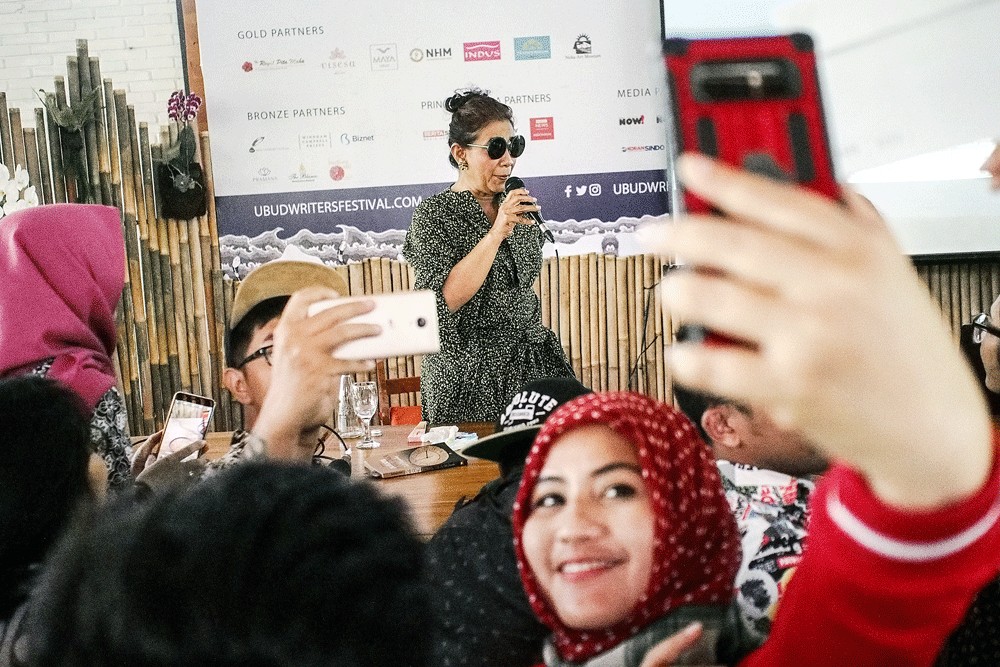Popular Reads
Top Results
Can't find what you're looking for?
View all search resultsPopular Reads
Top Results
Can't find what you're looking for?
View all search resultsWriters, activists gather for Ubud festival
The festival also got political with several discussions taking on serious tones, raising issues from human rights to religion.
Change text size
Gift Premium Articles
to Anyone
A
string of book launches, discussions and workshops were the highlight of the 2018 Ubud Writers and Readers Festival (UWRF) on Thursday, with the evening closing with a cultural night featuring a poetry reading and musical performances.
The festival, now in its 15th year, hosted the launches of several books including photobook Pause: Urban Decay, which explores everyday spaces that often go unnoticed, and graphic novel Gugug!, which invites readers to realize humans are not too distant from other animals.
The English translation of Indonesian author-filmmaker Djenar Maesa Ayu’s novel Nayla, originally published in 2005, was officially launched at the festival on Thursday. The book tells the story of a young girl who is physically and mentally abused by her mother, and her journey to find love and freedom.
Kan Lumé, who edited the translated book, said among the challenges of translating literary works into English was dealing with sentence structures and culturally specific idioms.
“That was why I kept asking Djenar what her intention was in using particular sentence structures or idioms,” said Singaporean Lumé, who is also Djenar’s husband.
Maritime Affairs and Fisheries Minister Susi Pudjiastuti was the festival’s speaker in the “Sink It” main program, the title of which came from her popular catchphrase for any foreign boats found illegally fishing in Indonesian waters. Susi reflected on the fight to protect the country’s millions of fisherfolk and vast marine resources.
The festival also got political with several discussions taking on serious tones, raising issues from human rights to religion.
American journalist and professor Janet Steele discussed her latest book, Mediating Islam, a report based on a richly layered study of the intersection of faith and the fourth estate.
In a separate discussion, former Australian Human Rights Commission president Gillian Triggs and Indonesian environmental activist and academic Saras Dewi raised concern over the tendency of politicians in their respective countries to persecute minority groups to gain power, with Triggs pointing out how Islamophobia was on the rise in her country.
“In the past 10 years, Australia has had the poorest leadership in history in terms of human rights [...] and if you don’t have strong ethical and legal leadership you give license for everybody to be lenient about human rights violations,” Triggs said.
She said she had also seen this exploitive “opportunistic political leadership” on the rise globally, with politicians using fake news or doctored photos to slander minority groups.
As one example, Triggs cited the “children overboard” affair that took place in Australia in 2001, when several politicians used fake photos to allege that seafaring asylum seekers were throwing their children overboard in an effort to secure entry into the country.
Saras pointed out that during presidential and legislative election seasons, it was Indonesia’s lesbian, gay, bisexual and transgender (LGBT) community that became a convenient target of many politicians for denigration and persecution.
Saras said politicians’ refusal to adopt human rights as a common decency principle was frustrating. “This is why we need the public to engage productively with what is happening in our society. We have to build critical communities,” she said.
While some people misused social media to agitate people with hate messages and fake news, Saras said it could be a powerful tool for activism if used benevolently, as seen in the success of grassroots movements in Bali in stopping the Benoa Bay reclamation project.
“The Benoa Bay case has also been successful because we infused our activism with local wisdom, the Tri Hita Karana philosophy [emphasizing harmonious coexistence between human and nature], into our movement,” Saras said.
Thursday’s events ended with a cultural evening featuring Saras, an Indonesian poetess, whose works reflect traditional Balinese tenets on the harmonious relationship between humans and the environment, and Andre Septiawan, a young poet from West Sumatra, whose poems beautifully capture the poetic quality of the Malay language and the daily life of ordinary villagers.
The featured musicians in the evening included virtuoso musician-composer Rodrigo Parejo, who performed Spanish jazz, and Sydney-based singer-songwriter Miriam Lieberman, who has been praised for her ability to blend patterned westernized pop writing with the earthy mystique of African rhythms.











